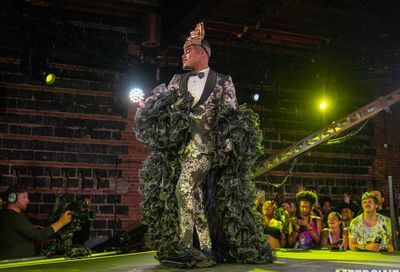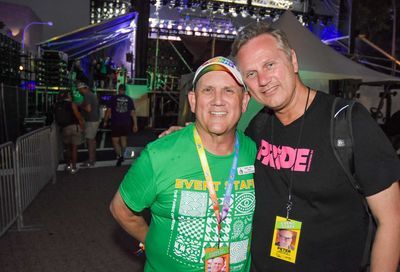Amy Coney Barrett calls sexual orientation a “preference,” then apologizes for it
Supreme Court nominee has also drawn criticism for her ties to the anti-LGBTQ Alliance Defending Freedom

Supreme Court nominee Amy Coney Barrett apologized for using the term “sexual preference” in one of her answers to questions from Democrats on the Senate Judiciary Committee regarding LGBTQ rights during her confirmation hearing.
On Tuesday morning, U.S. Sen. Dianne Feinstein (D-Calif.), questioned Barrett’s impartiality when it comes to dealing with cases involving same-sex marriage, and whether she would overturn the 2015 Obergefell decision, which legalized marriage equality by striking down all bans on same-sex marriage as unconstitutional.
“I have no agenda, and I do want to be clear that I have never discriminated on the basis of sexual preference and would not ever discriminate on the basis of sexual preference,” Barrett said. “Like racism, I think discrimination is abhorrent.”
Later in the day, Barrett was called out for those remarks by Sen. Mazie Hirono (D-Hawaii), who alleged that Barrett’s use of an outdated and inflammatory term might be indicative of hostility towards LGBTQ individuals, saying she believed Barrett’s use of the term was deliberate.
“Sexual preference is an offensive and outdated term. It is used by anti-LGBTQ activists to suggest that sexual orientation is a choice. It is not,” Hirono said. “Sexual orientation is a key part of a person’s identity.
“That sexual orientation is both a normal expression of human sexuality and immutable was a key part of the majority’s opinion in Obergefell,” added Hirono. “If it is your view that sexual orientation is merely a ‘preference,’ as you stated, then the LGBTQ community should be rightly concerned about whether you would uphold their right to marry.”
Barrett later responded to Hirono’s allegations, saying she did not intend to offend anyone with her word choice.
“I certainly didn’t mean and would never mean to use a term that would cause any offense in the LGBTQ community,” Barrett said. “If I did, I greatly apologize for that. I simply meant to be referring to Obergefell‘s holding with respect to same-sex marriage.”
She also insisted that she was trying to be neutral when avoiding answering questions about challenges to Obergefell or other LGBTQ rights cases that might come before the court in the future.
See also: Trump SCOTUS pick Amy Coney Barrett would “dismantle” LGBTQ rights, critics say
Barrett reiterated her apology for any offense under questioning from Sen. Cory Booker (D-N.J.), saying “she did not mean to imply that it’s not an immutable characteristic, or that it’s solely a matter of preference.”
“I fully respect all the rights of the LGBTQ community,” Barrett said. “Obergefell is an important precedent of the court. I reject any kind of discrimination on any sort of basis.”
Pressed by Booker on a recent opinion by Supreme Court Justices Clarence Thomas and Samuel Alito calling for the court to revisit the Obergefell decision, with the aim of overturning it, Barrett declined to answer the question, saying she didn’t know what the justices were referring to when they cast the decision as a “problem” that the high court must “fix.”
LGBTQ rights groups took offense to the connotation that sexual orientation is a “preference,” which they say falsely suggests that a person has a choice in the matter, and is used to justify the use of “conversion therapy” to forcibly change a person’s sexual orientation or gender identity.
The LGBTQ legal advocacy organization Lambda Legal tweeted that Barrett’s choice of words was a “dogwhistle” to social conservatives who oppose LGBTQ equality.
IMPORTANT:
Barrett used "sexual preference" (not "sexual orientation") when discussing her views on marriage equality.
This is a dogwhistle. The term "sexual preference" is used by opponents of equality to suggest that being #LGBTQ is a choice.#BlockBarrett #SCOTUSHearing pic.twitter.com/kkftq9l2l5
— Lambda Legal (@LambdaLegal) October 13, 2020
Lambda Legal previously called out Barrett for her ties to Alliance Defending Freedom, where she was a legal fellow. In response to a question from Sen. Patrick Leahy (D-Vt.) about whether she was aware of ADF’s advocacy against same-sex marriage, Barrett responded that she was not. However, Lambda Legal provided a screenshot of ADF’s website in which the organization specifically states that marriage can only be between a man and a woman.
The webpage in question asks readers: “What foundation do you want to build the future on?,” providing two visions of society: one in which heterosexual marriages are the building block for society and place the needs of children first; and the other, in which “individual desires trump what is best for society.”
“In this society, marriage is defined as the emotional union of two or more consenting adults, and the well-being of children and the benefit of society are an afterthought,” the website reads. “Disagreement with this view is seen as a threat — some rights, such as sexual rights, are considered more important than rights such as religious freedom.”
The Human Rights Campaign has criticized the international arm of the ADF for an intervention, or the equivalent of an amicus brief, asking the European Court of Human Rights to uphold laws requiring transgender people to be sterilized if they undergo a transition. The organization has argued against repealing laws that criminalize homosexuality, both in the United States — coming out against the majority finding in the landmark Lawrence v. Texas case overturning anti-sodomy laws — and praising courts in India, Jamaica, and Belize that dole out prison sentences for those convicted of homosexuality or engaging in same-sex relations.
Domestically, the ADF the U.S. Supreme Court should find that Title VII does not protect employees from being fired due to their sexual orientation or gender identity, and has been linked to several anti-LGBTQ bills being pushed in various states.

When questioned by Sen. Josh Hawley, however, Barrett defended giving a lecture to ADF’s Blackstone program, a summer-long legal program designed to train Christian lawyers-in-training, saying she gave a one-hour lecture on originalism “four or five times” to students enrolled in the program.
“I had several other colleagues who had participated in the Blackstone program, lecturing. I heard great things about it from them. We had a contingent of students from Notre Dame regularly attend this program, and they were among our most engaged and smartest students,” Barrett said of her choice to accept an invitation to lecture at Blackstone.
“I certainly didn’t think there was anything wrong with my going to speak with a group of Christian law students about my legal expertise,” she added.
But some advocates expressed skepticism about her ability to be impartial in cases involving LGBTQ rights given those ties, as well as previous writings in which she criticized court rulings on marriage equality and transgender workplace rights.
“Judge Amy Coney Barrett’s record is filled with red flags that should disqualify her from sitting on the U.S. Supreme Court. Given her perverse, reactionary judicial philosophy, Judge Barrett is unfit to fill the seat, much less the shoes, of the late Justice Ruth Bader Ginsburg,” Sasha Buchert, a senior attorney at Lambda Legal, said in a statement.
“There is so much at stake for LGBTQ people and everyone living with HIV right now because so much of our civil rights progress has happened in the courts,” Buchert added. “Decades of hard work have led to legal victories such as the right to marry the person we love, to protect our families, to access health care and make decisions about our bodies. Judge Amy Coney Barrett’s record is fundamentally at odds with basic guarantees of equality, liberty, justice and dignity under the law for our communities. It is impossible for LGBTQ people to have confidence in Judge Barrett as her publicly available record makes clear that she would be unable or unwilling to respect and affirm our rights to equal protection of the laws.”
Read more:
Gay man assaulted while filming TikTok in New York City
Woman goes viral for angrily asserting “Love is Love, bitch! Gay Pride!”
2020 is the deadliest year on record for transgender Americans
Support Metro Weekly’s Journalism
These are challenging times for news organizations. And yet it’s crucial we stay active and provide vital resources and information to both our local readers and the world. So won’t you please take a moment and consider supporting Metro Weekly with a membership? For as little as $5 a month, you can help ensure Metro Weekly magazine and MetroWeekly.com remain free, viable resources as we provide the best, most diverse, culturally-resonant LGBTQ coverage in both the D.C. region and around the world. Memberships come with exclusive perks and discounts, your own personal digital delivery of each week’s magazine (and an archive), access to our Member's Lounge when it launches this fall, and exclusive members-only items like Metro Weekly Membership Mugs and Tote Bags! Check out all our membership levels here and please join us today!






























You must be logged in to post a comment.